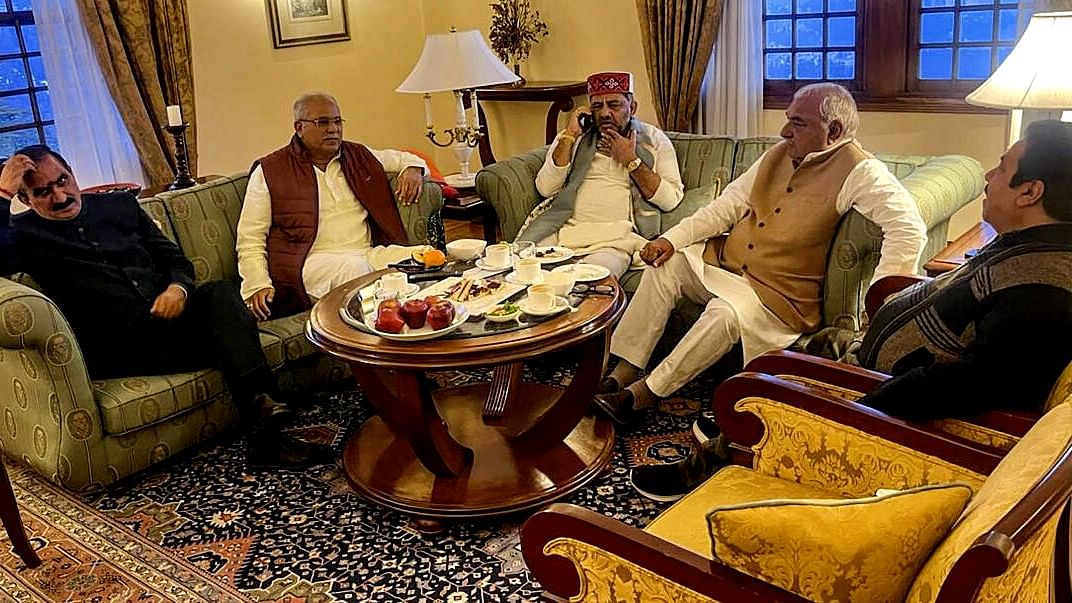
Himachal Pradesh Chief Minister Sukhvinder Singh Sukhu, Karnataka Deputy Chief Minister DK Shivakumar, Former Chhattisgarh chief minister Bhupesh Baghel, Former Haryana chief minister Bhupinder Singh Hooda and Congress leader Rajeev Shukla during a meeting, in Shimla, Wednesday, Feb. 28, 2024.
Credit: PTI Photo
The Rajya Sabha elections on February 27 showed that the Opposition must properly deal with the depredations of the Bharatiya Janata Party (BJP) unless it is to be ambushed time and again.
The BJP has so ratcheted up the practice of poaching that democracy has almost been annulled. It has deep pockets and has been alleged to influence the decisions of legislators from the Opposition camp. We know that where there is payola there is peculation – the political class is awash with bribable elected representatives.
Let’s concentrate on the Congress. It had enough MLAs in Himachal Pradesh to win the single Rajya Sabha seat there, but the party’s candidate, spokesman Abhishek Manu Singhvi, lost as six MLAs cross-voted alongside three independents MLAs.
After the 2022 Assembly elections, it bucked prevailing trends to win 40 seats in the 68-member Assembly, while the BJP won 25. Three independent MLAs supported the government, giving it a comfortable majority. Now, if the nine MLAs make a permanent switch, the government will be on the edge, though Chief Minister Sukhwinder Singh Sukhu can take solace from the fact that the Speaker can disqualify the defecting members, which will give his party 34 seats in a 62-member House, a thin majority.
What could complicate things for the BJP is the Speaker’s decision to suspend 15 BJP MLAs from the Assembly on February 28.
As of now, the six presumptively defecting MLAs and three independents have removed themselves to Haryana, pending a likely no-trust motion when the Assembly meets — it’s a rerun of a despicable and degrading tactic used by the BJP, which is unfortunately dignified with the name ‘Operation Kamal’. This kind of activity is to a ‘political operation’ what grand larceny is to a ‘business transaction’.
Expect more
Nevertheless, the Congress needs to look at the situation rationally. First, its happened and the party can expect more of it — it will take 13 defecting MLAs, assuming all defectors will be suspended, to topple the government. Some way to go yet.
Second, in the run-up to the general elections, with four seats in Himachal Pradesh to be won, the Congress should consider itself lucky that the defectors have tipped their hands at this point rather than sabotaging the party’s prospects further down the road. It could also help the party in the distribution of tickets.
Stop these self-goals
But, most important, the Congress must remember that it continues to help the BJP succeed in its larcenous activities by scoring self-goals. Thus, in July 2019, the BJP was helped in its capture of Karnataka by securing defections due to the lack of a leader in the Congress. Rahul Gandhi had resigned as party president and it took the party nearly three months to nominate Sonia Gandhi as interim chief. It took over two more years to elect a full-time head.
Soon after Karnataka, the inability to reconcile Jyotiraditya Scindia’s ambitions with the incomprehensible desire to persist with an allegedly corrupt and self-driven Kamal Nath, led to the fall of the Madhya Pradesh government, which is not to say the former’s conduct is to be held up as a model.
Incompetent, ineffective
Nevertheless, the important takeaway is that even where it still has a presence, the Congress finds itself unable to retain control. One reason is that it keeps shuffling the same people around in positions of power despite overabundant evidence that they are ineffective — like Rajiv Shukla as the supervisor of Himachal Pradesh affairs. This happened in its latest organisational reshuffle in December. It’s inexplicable that K C Venugopal should continue to hold the critical position of general secretary (organisation) despite his manifest incompetence at every hurdle.
It’s a difficult kind of cronyism. Only Rahul Gandhi’s sycophants get positions of power and responsibility, with a few exceptions — like Rajasthan MLA Sachin Pilot in December.
Hard decisions
There’s the intransigent refusal to set the organisation in order. By now an elected parliamentary board (CPB) should have been in place. This is not a quibble. The CPB has historically played a crucial role in settling organisational matters. Plus, the fatal reluctance to take hard decisions has resulted in nominating a jumbo, 85-member working committee, instead of a partly elected, 15-member one with a proper remit. Finally, there is the easy option of allowing ad hoc Pradesh Congress Committees to remain in place, instead of allowing elections to sort the wheat from the chaff.
Obviously, nothing can be done now to solve structural problems, with general elections impending. But surely more dynamic, independent, and less self-interested people can be chosen to oversee the crucial task of selecting candidates. Organisational nous is needed to help consolidate the capital being generated by Rahul Gandhi’s yatras.
(Suhit K Sen is author of ‘The Paradox of Populism: The Indira Gandhi Years, 1966-1977’)
Disclaimer: The views expressed above are the author's own. They do not necessarily reflect the views of DH.